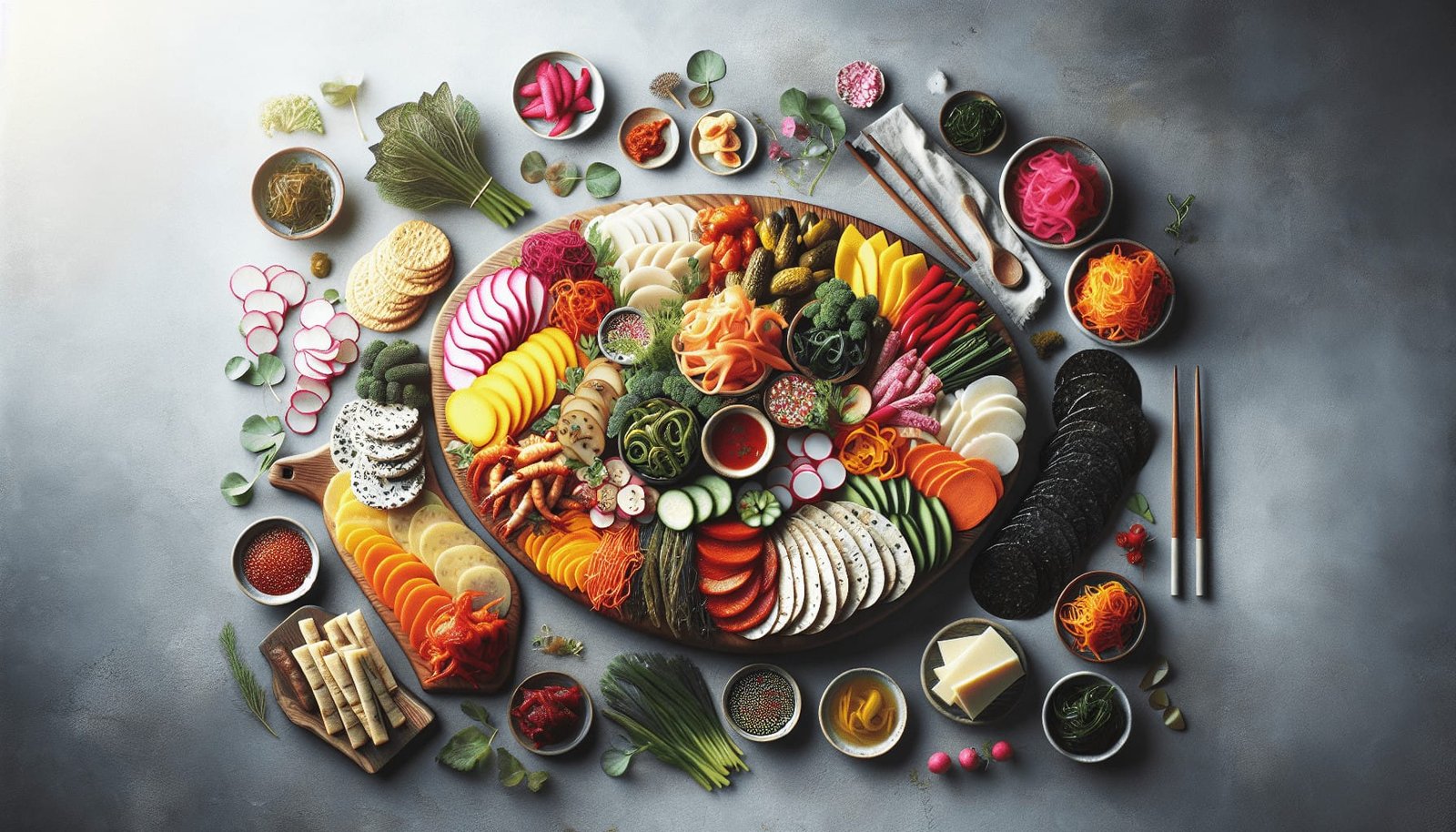Have you ever thought about how traditional culinary elements from different parts of the world can be combined to create a harmonious, visually appealing, and mouthwatering experience? Korean-inspired charcuterie boards are a growing trend that does exactly that, merging the flavors and presentation styles of Korea with the much-loved Western charcuterie board.
The Evolution of Charcuterie Boards
Charcuterie boards have a storied history, traditionally featuring a selection of cured meats, cheeses, nuts, fruits, and condiments. They offer a delightful way to sample a variety of flavors and textures in one sitting, encouraging social dining and conversation. The transformation and adaptation of charcuterie boards to include global flavors exemplify the ever-evolving nature of food culture.
The Influence of Korean Cuisine
Korean cuisine is known for its bold flavors, vibrant colors, and textures, which make it a perfect candidate for inclusion in modern charcuterie boards. The emphasis on fermentation, spicy elements, and the interplay between sweet and savory flavors can elevate the charcuterie experience into something fresh and unique.
Integrating Korean Elements
When diving into the trend of Korean-inspired charcuterie boards, it’s essential to consider which components and flavors from Korean cuisine can be incorporated into the traditional format. Here’s a guide on how to fuse these two worlds beautifully.
Korean Meats
Korean BBQ meats are an iconic starting point. Think marinated bulgogi, spicy pork, or even the more adventurous sliced raw beef, known as Yukhoe. Preparing these meats in a manner that makes them easy to pick up and enjoy is key.
Banchan: Korean Side Dishes
Introducing a variety of Korean side dishes, or banchan, to a charcuterie board can add both color and flavor. From the universally loved kimchi to slightly less known pickled radishes or crispy seaweed snacks, these small dishes can serve as perfect accompaniments to meats and cheeses.
Korean Cheeses
While not traditionally part of Korean cuisine, cheese has gained popularity in Korea in recent years. Cheeses infused with Korean flavors or served with Korean condiments can add a localized twist to your board. Consider a soft cheese with a gochujang glaze, or a cheddar paired with a sweet Korean pear relish.
Fermented Flavors
Fermentation is at the heart of many Korean dishes. Incorporating Korean pickles and fermented pastes, like doenjang (fermented soybean paste), can offer a taste of authenticity while providing the savory depth that complements cured meats and cheeses.
Korean-Inspired Condiments and Dips
Go beyond mustard and jam. Dips like kimchi hummus, gochujang aioli, or ssamjang (a thick, spicy condiment) can be served alongside the meats and crackers to provide something a little different and exciting.

Aesthetics: The Korean Way
Presentation plays a crucial role in any charcuterie board. The way you present the food can turn a simple meal into a feast for the eyes. Korean culture, with its appreciation for harmony and balance, can teach us much about presentation.
Harmony in Color and Arrangement
Use a balance of colors, just like in Korean temples and gardens, where balance is essential. Arrange your board so that the colors are balanced and natural elements are juxtaposed with human-made creations.
Traditional Korean Tableware
Consider using traditional Korean serverware and utensils to enhance the authenticity of the experience. Bowls for banchan, bamboo trays, and beautifully carved wooden serving boards can add an extra touch of elegance.
Pairing Drinks with Your Korean-Inspired Charcuterie Board
No charcuterie board is complete without the right beverage pairing. Korean drinks have their own unique profiles, and selecting the right beverage can elevate the dining experience.
Traditional Korean Beverages
Makgeolli, a slightly sweet and tangy rice wine, can be a delightful pairing with your board’s spicy and savory elements. Soju, another famous Korean drink, can deliver a clean alcohol taste that doesn’t overpower the food. Or perhaps a delicate green tea might offer a softer counterpart to the rich flavors of your charcuterie choices.

Summary of Key Elements in a Table
These key elements provide a handy reference to see how you can assemble a Korean-inspired charcuterie board:
| Element | Description |
|---|---|
| Korean Meats | Bulgogi, spicy pork, and yukhoe. |
| Banchan | Kimchi, pickled radishes, crispy seaweed snacks. |
| Korean Cheeses | Cheeses with Korean flavors or pairings. |
| Fermented Flavors | Doenjang, Korean pickles. |
| Condiments & Dips | Kimchi hummus, gochujang aioli, ssamjang. |
| Drinks Pairing | Makgeolli, soju, green tea. |
| Presentation | Use of Korean serverware and harmonious color arrangements. |
Future Directions and Trends
As the popularity of Korean-inspired charcuterie boards grows, so does the potential for new and exciting innovations. Here are some anticipated trends that might shape how we build and enjoy these boards in the future.
Hybrid Ingredients
Expect to see more cross-cultural ingredients emerge, combining Korean flavors with those of other cuisines. Imagine kimchi-flavored salamis or cheese blocks with infused sweet-sour flavors of Asian pears and gochugaru flakes.
Collaborative Dining Experiences
The communal nature of Korean dining emphasizes sharing and collective enjoyment. This aligns perfectly with the social character of charcuterie boards, encouraging shared eating experiences where everyone contributes their favorite Korean-inspired elements.
Sustainable and Ethical Options
With a growing focus on sustainability, expect to see more ethical and environmentally friendly ingredient selections. Locally sourced produce that mimics authentic Korean ingredients will be key, as will more plant-based options.
Charcuterie Boards for Different Occasions
People are beginning to use charcuterie boards not just as appetizers or snacks, but as central parts of meal services. Expect to see breakfast versions with Korean twists, dessert boards featuring sweet Korean treats, and more.

How to Create Your Own Korean-inspired Charcuterie Board at Home
Creating your own Korean-inspired charcuterie board at home can be a rewarding experience. Following these steps can elevate your food presentation and appetizer game for any gathering or occasion.
Step 1: Select Your Ingredients
Start with a balanced selection of flavors and textures. Ensure your board consists of elements from the various categories discussed: meats, cheeses, banchan, fermented flavors, and condiments.
Step 2: Prepare Your Ingredients
Preparation is key. Marinate your meats the day before to ensure they’re rich in flavor. Cut cheeses into bite-sized portions, and pre-prepare your banchan to keep it fresh and tasty.
Step 3: Arrange Thoughtfully
Arrange your board with consideration to color balance and accessibility. Group similar flavors together but ensure they are spaced to allow easy reach.
Step 4: Add the Finishing Touches
Decorate your board with garnishes, such as edible flowers or herbs, to add a finishing touch. Use Korean touches like small chilies or perilla leaves to keep themes intact.
Step 5: Pair the Right Drinks
Select a beverage that complements your flavors. Provide at least one non-alcoholic option, such as a flavored sparkling water or traditional tea, to cater to all preferences.
Step 6: Enjoy and Share
After all the preparations, it’s time to enjoy this creation. Savor each bite, appreciate the fusion of flavors, and share your masterpiece with friends and family.
Conclusion
Creating a Korean-inspired charcuterie board is not just about merging cuisines—it’s about celebrating a world of flavors and the joy of shared dining experiences. By blending traditional elements from two cultures, we find new ways to enjoy and appreciate food. Whether you’re a culinary adventurous enthusiast or just someone looking to try something new, these trends offer a delicious path to explore a unique cultural connection through food.
Go ahead and embrace the bold, vibrant flavors of Korea with the comforting, familiar concept of a charcuterie board, and enjoy a dining experience that is both innovative and heartfelt.

